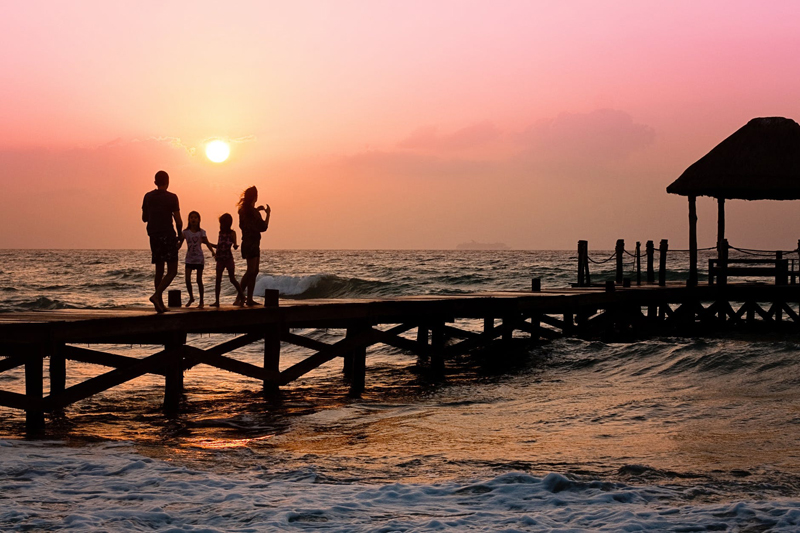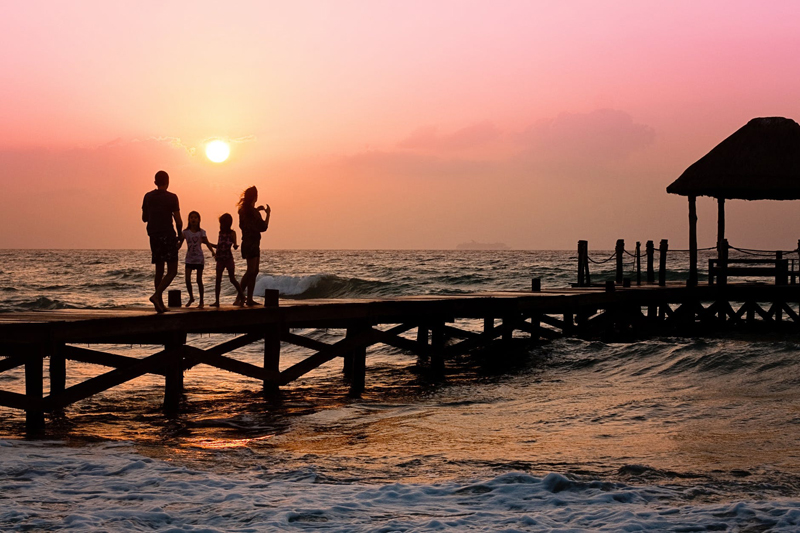Learn About the City of Ammonihah

Ammonihah, pronounced Amo-NI-hah, is the city which rejected Alma and Amulek, burned believers, boasted of their greatness and were later destroyed. But, with a bit of research, we can discover even more.
Ammonihah was a great Nephite city in the land of Zarahemla, which was settled by the Mulekites who fled Jerusalem shortly after Lehi. The Lord led Mulek’s people ‘into the land north, and Lehi into the land south’ (Hel. 6:10). At some later time, Mulek’s descendents traveled south and settled in the land of Zarahemla.
In the land south, Nephi and his people separated themselves from Laman and Lemuel (see 2 Nephi 5). Within a few generations the separated Nephites began to have internal problems. Finally the righteous Mosiah I was commanded to take "as many as would hearken unto the voice of the Lord…with him, into the wilderness” (Omni 1:12).
“...and they were led by the power of (God's) arm, through the wilderness until they came down into the land which is called the land of Zarahemla…(and) discovered that the people of Zarahemla came out from Jerusalem at the time that Zedekiah, king of Judah, was carried away captive into Babylon.” (Omni 1: 13 and 15).
What a testimony-building experience! Up to this time, the righteous Nephites could only believe the words of Lehi that Jerusalem had fallen (see 2 Nephi 1:4). Now they had living proof that all Lehi said was true. Time vindicates the prophets!
The Mulekites and righteous Nephites united. Mosiah I, a prophet and seer of the Lord, became their ruler (Omni 1:19) and the united population grew in the land. Upon Mosiah I’s death his son, Benjamin, became king. Near the end of his life, King Benjamin conferred the kingship of the land of Zarahemla upon his righteous son, Mosiah II. “And there was no contention among all his people for the space of three years.”
All the cities and people located in the land of Zarahemla, including the people of Ammonihah, dwelt there in peace.
When Mosiah II approached the end of his life, none of his son’s wanted to rule. Mosiah II then laid plans for a group of righteous judges to oversee the legal needs of the people (see Mosiah 29). It was the year 92 B.C.
But, just a decade later (in 82 B.C.), recommitted Alma the Younger saw that “Satan had gotten great hold upon the hearts of the people of the city of Ammonihah” (Alma 8:9). The people of Ammonihah had turned the system of righteous judges into a system of personal gain and were studying "that they may destroy the liberty” of the people (see Alma 8:17 and Alma 11). They refused to accept Alma and had distorted the scriptures to such a degree that they no longer even believed in a resurrection (Alma 8:12 and 12:21)!
In ten short years they had fallen from a people “highly favored of the Lord”, a people who had been "visited by the Spirit of God, having conversed with angels, and having been spoken unto by the voice of the Lord; and having the spirit of prophecy, and the spirit of revelation, and also many gifts” (see Alma 9).
This city once held a choice people. No wonder Alma "wrestled with God in mighty prayer, that he would pour out his Spirit upon the people who were in the city” (Alma 8:10)! No wonder he and Amulek clearly retaught them the doctrines of accountability, the Pre-Existence, the fall of Adam and Eve, the foreordained role of Christ, the power and purpose of the Atonement, the reality of the resurrection, the authority of the priesthood and the plan of salvation. No wonder they plead with the people to understand the truth that when a blessed people go "contrary to the light and knowledge which they do have,” they face the fullness of the Lord’s wrath.
So what happened to the people in one decade?
A short comment in Alma 16 gives us a clue…“they were of the profession of Nehor” (vs. 11).
Nehor, a Nephite, introduced priestcraft to the people. A large and powerful man, he taught contrary to the prophets. Nehor said that priests should “be supported by the people” (Alma 1:3), that people did not need to worry about the last day "for the Lord had created all men and had also redeemed all men; and, in the end, all men should have eternal life.” Pride lifted Nehor and his followers to wear costly apparel, look down on those who did not believe as they did, and to enforce their beliefs with physical force--even unto the killing of those who opposed them.
The people of Ammonihah had fallen victim to their own pride, industry and intelligence. They gave God no credit for their success.
Despite the powerful testimonies of Alma and Amulek and the deep truths they expounded, the majority of the people of Ammonihah did not repent. Just four short years later, in 78 B.C., the entire city of Ammonihah was destroyed in a single day. “And the carcasses were mangled by dogs and wild beasts…and now so great was the scent thereof that the people did not go in to possess the land of Ammonihah for many years. And it was called Desolation of Nehors, for …and their lands remained desolate.” (Alma 16:10-11).
The people of Ammonihah give grim testimony that if we get caught up in our pride, our talent, our money or our intelligence, we can really 'stink' things up. Worse, we stand to lose everything. It can happen in ten years or a single day.
“Their lands remained desolate” is a sorrowful reminder of what awaits us eternally if we turn away from the things of God. We, too, can remain desolate forever. To me, that means living forever without my family. That would be true desolation!
Repentance is a small effort that reaps a great reward.
Ammonihah was a great Nephite city in the land of Zarahemla, which was settled by the Mulekites who fled Jerusalem shortly after Lehi. The Lord led Mulek’s people ‘into the land north, and Lehi into the land south’ (Hel. 6:10). At some later time, Mulek’s descendents traveled south and settled in the land of Zarahemla.
In the land south, Nephi and his people separated themselves from Laman and Lemuel (see 2 Nephi 5). Within a few generations the separated Nephites began to have internal problems. Finally the righteous Mosiah I was commanded to take "as many as would hearken unto the voice of the Lord…with him, into the wilderness” (Omni 1:12).
“...and they were led by the power of (God's) arm, through the wilderness until they came down into the land which is called the land of Zarahemla…(and) discovered that the people of Zarahemla came out from Jerusalem at the time that Zedekiah, king of Judah, was carried away captive into Babylon.” (Omni 1: 13 and 15).
What a testimony-building experience! Up to this time, the righteous Nephites could only believe the words of Lehi that Jerusalem had fallen (see 2 Nephi 1:4). Now they had living proof that all Lehi said was true. Time vindicates the prophets!
The Mulekites and righteous Nephites united. Mosiah I, a prophet and seer of the Lord, became their ruler (Omni 1:19) and the united population grew in the land. Upon Mosiah I’s death his son, Benjamin, became king. Near the end of his life, King Benjamin conferred the kingship of the land of Zarahemla upon his righteous son, Mosiah II. “And there was no contention among all his people for the space of three years.”
All the cities and people located in the land of Zarahemla, including the people of Ammonihah, dwelt there in peace.
When Mosiah II approached the end of his life, none of his son’s wanted to rule. Mosiah II then laid plans for a group of righteous judges to oversee the legal needs of the people (see Mosiah 29). It was the year 92 B.C.
But, just a decade later (in 82 B.C.), recommitted Alma the Younger saw that “Satan had gotten great hold upon the hearts of the people of the city of Ammonihah” (Alma 8:9). The people of Ammonihah had turned the system of righteous judges into a system of personal gain and were studying "that they may destroy the liberty” of the people (see Alma 8:17 and Alma 11). They refused to accept Alma and had distorted the scriptures to such a degree that they no longer even believed in a resurrection (Alma 8:12 and 12:21)!
In ten short years they had fallen from a people “highly favored of the Lord”, a people who had been "visited by the Spirit of God, having conversed with angels, and having been spoken unto by the voice of the Lord; and having the spirit of prophecy, and the spirit of revelation, and also many gifts” (see Alma 9).
This city once held a choice people. No wonder Alma "wrestled with God in mighty prayer, that he would pour out his Spirit upon the people who were in the city” (Alma 8:10)! No wonder he and Amulek clearly retaught them the doctrines of accountability, the Pre-Existence, the fall of Adam and Eve, the foreordained role of Christ, the power and purpose of the Atonement, the reality of the resurrection, the authority of the priesthood and the plan of salvation. No wonder they plead with the people to understand the truth that when a blessed people go "contrary to the light and knowledge which they do have,” they face the fullness of the Lord’s wrath.
So what happened to the people in one decade?
A short comment in Alma 16 gives us a clue…“they were of the profession of Nehor” (vs. 11).
Nehor, a Nephite, introduced priestcraft to the people. A large and powerful man, he taught contrary to the prophets. Nehor said that priests should “be supported by the people” (Alma 1:3), that people did not need to worry about the last day "for the Lord had created all men and had also redeemed all men; and, in the end, all men should have eternal life.” Pride lifted Nehor and his followers to wear costly apparel, look down on those who did not believe as they did, and to enforce their beliefs with physical force--even unto the killing of those who opposed them.
The people of Ammonihah had fallen victim to their own pride, industry and intelligence. They gave God no credit for their success.
Despite the powerful testimonies of Alma and Amulek and the deep truths they expounded, the majority of the people of Ammonihah did not repent. Just four short years later, in 78 B.C., the entire city of Ammonihah was destroyed in a single day. “And the carcasses were mangled by dogs and wild beasts…and now so great was the scent thereof that the people did not go in to possess the land of Ammonihah for many years. And it was called Desolation of Nehors, for …and their lands remained desolate.” (Alma 16:10-11).
The people of Ammonihah give grim testimony that if we get caught up in our pride, our talent, our money or our intelligence, we can really 'stink' things up. Worse, we stand to lose everything. It can happen in ten years or a single day.
“Their lands remained desolate” is a sorrowful reminder of what awaits us eternally if we turn away from the things of God. We, too, can remain desolate forever. To me, that means living forever without my family. That would be true desolation!
Repentance is a small effort that reaps a great reward.

Related Articles
Editor's Picks Articles
Top Ten Articles
Previous Features
Site Map
Content copyright © 2023 by T. Lynn Adams. All rights reserved.
This content was written by T. Lynn Adams. If you wish to use this content in any manner, you need written permission. Contact Jamie Rose for details.



